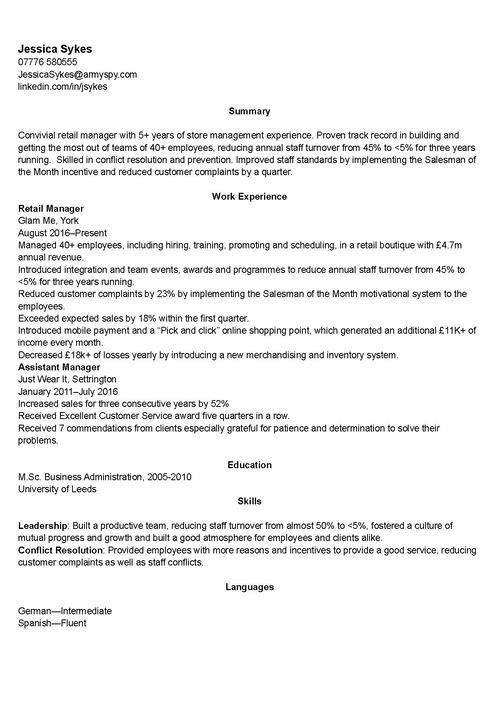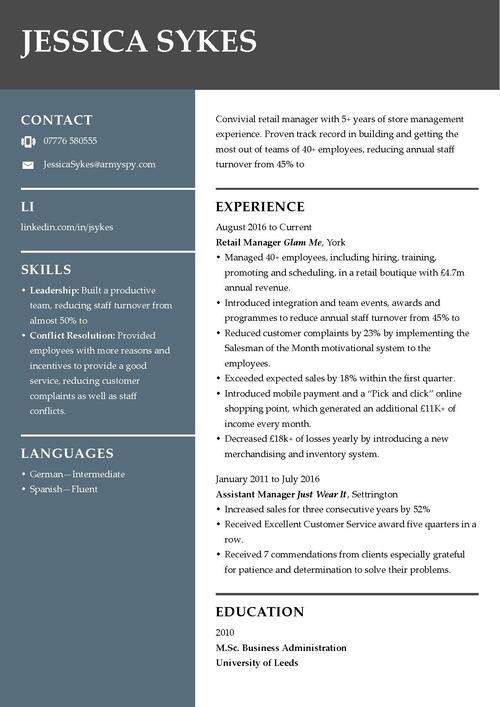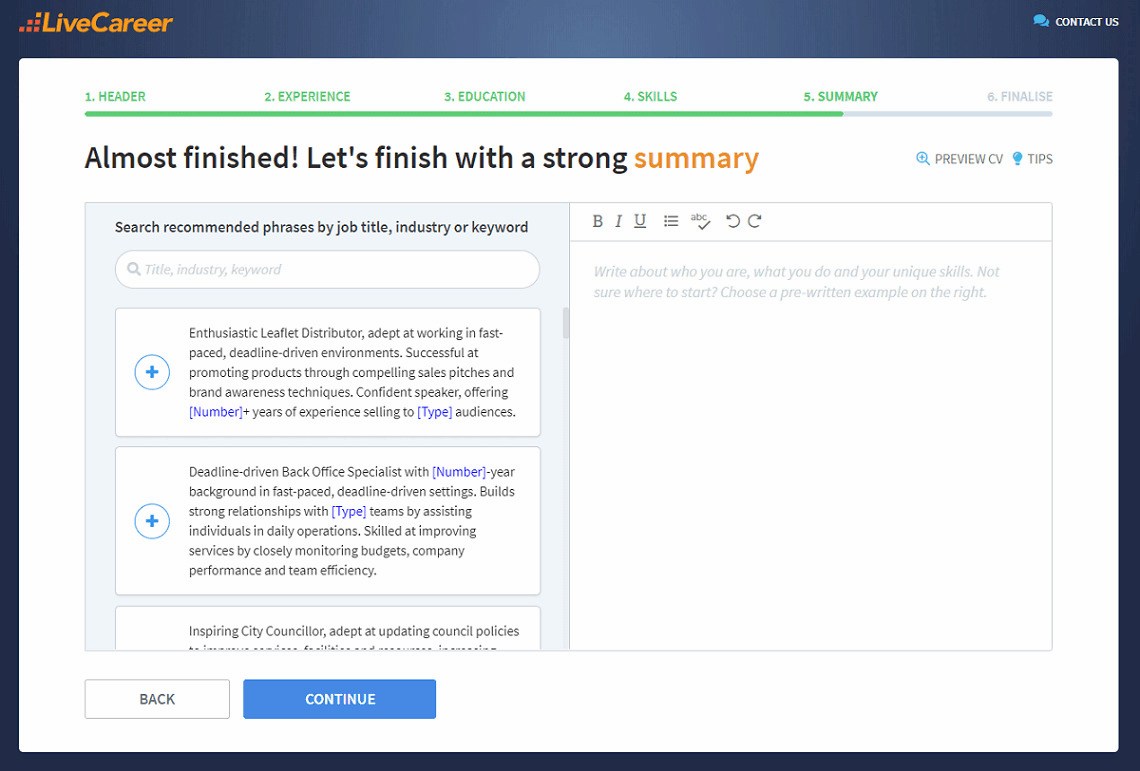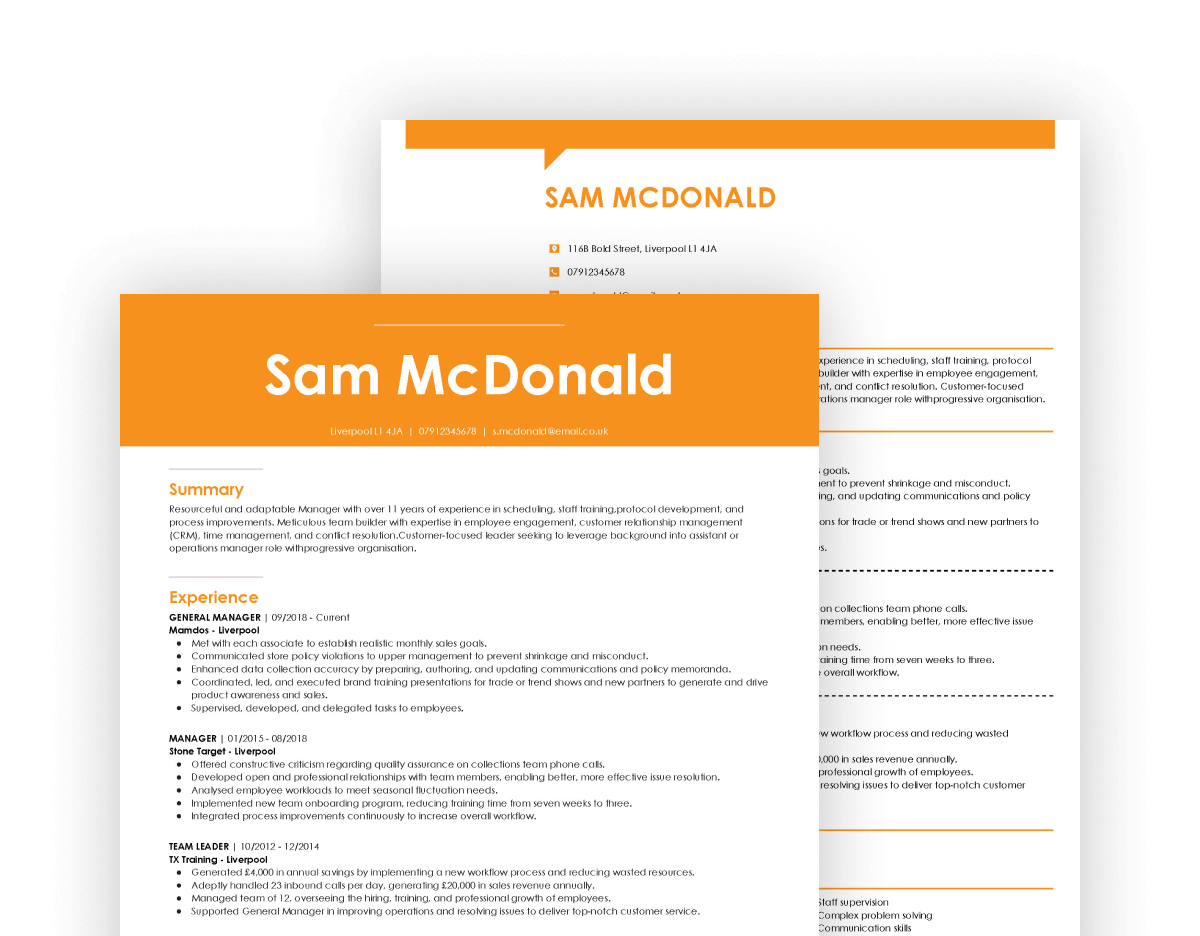Create a professional CV now!
 NO
NO YES
YESOur customers were hired by:
Interpersonal skills, or ‘people skills’, are a group of abilities that allow the clear flow of ideas and information; non-confrontational and effective cooperation; and general cohesiveness of individuals in groups. They’re critical to maintaining good relationships in the workplace and in our daily lives.
Computer programmers may get close, but most of us cannot have a career without constant interaction with other people. The basic ability of getting along with other people can yield a significant advantage in your career.
For some, it comes as their nature. Others have to learn carefully how to interact with others to obtain outcomes that are beneficial for everyone. Read on, and you’ll be an expert in understanding these skills and putting them to paper.
Create an effective CV in minutes. Choose a professional CV template and fill in every section of your CV in a flash using ready-made content and expert tips.
Create a professional CV now!
 NO
NO YES
YESWe created the sample on the right using our builder. See other good CV examples like this one.
Writing a skills list on a CV? You might want to see these guides:
Jessica Sykes
07776 580555
JessicaSykes@armyspy.com
linkedin.com/in/jsykes
Summary
Convivial retail manager with 5+ years of store management experience. Proven track record in building and getting the most out of teams of 40+ employees, reducing annual staff turnover from 45% to <5% for three years running. Skilled in conflict resolution and prevention. Improved staff standards by implementing the Salesman of the Month incentive and reduced customer complaints by a quarter.
Work Experience
Retail Manager
Glam Me, York
August 2016–Present
Assistant Manager
Just Wear It, Settrington
January 2011–July 2016
Education
M.Sc. Business Administration, 2005-2010
University of Leeds
Skills
Languages
Interpersonal skills are a group of connected transferable skills that together make up your ability to get work done with people. They are much more than communication skills alone as they relate not only to the content of the message, but also to maintaining long-term workplace relationships. That's why these jobs skills are highly valued by employers.
Here are the key examples of strong interpersonal skills:
There is only one way to build the two-way street of communication that every employee wants. Nobody likes only being told, without being listened to. Engaging with the conversation, extracting the crux of the issue and all the relevant information, is a skill beneficial to both parties.
Being heard, or listened to, sometimes isn’t enough. You also have to be able to put yourself in their shoes and try to understand their point of view, needs and feelings. Empathy is an important skill, especially in management, it allows you to become a friend, rather than a dictator.
Your honesty towards others and yourself is a key factor in how you are perceived in the workplace. Being not only honest and open, but also willing to admit to mistakes makes you trustworthy and inspiring. Admitting to mistakes allows improving on them next time.
Having a positive atmosphere in the workplace where everyone gets along makes for happy and productive colleagues and creates an opportunity to grow for everyone. The more capable and experienced employees should teach and mentor the new catches if there is to be sustained growth.
By being assertive, respectful, and diplomatic, you must work to resolve both internal and external problems in a timely and productive manner. This limits the damage early, and avoids speed bumps.
Leadership and teamwork skills are closely linked. Effective leaders guide their teams, knowing when to step up and provide direction. They balance interpersonal skills to lead and motivate the team, especially during challenging times.
Being defensive and excessively prideful of your work hinders your ability to improve. Every piece of feedback is a teachable moment and allows progress to take place. Don’t sell yourself short by overly defending something others can see is imperfect.
The ability to give constructive feedback in a non-offensive manner is extremely valuable, especially considering that most people’s natural response is defence. Masterfully manoeuvring around this defence to secure progress for all is a skill that makes the best team leaders.
Sometimes, words can leave ambiguity and uncertainty behind. The tonality of your voice and body language give away more about your emotional attitude than words do, that’s why making sure they’re all consistent is important to make sure there are no misunderstandings.
A strong CV summary will convince the recruiter you’re the perfect candidate. Save time and choose a ready-made personal statement written by career experts and adjust it to your needs in the LiveCareer CV builder.

So how do we write ‘I’m a people person’ in a more effective way? The question: ‘how to write a CV?’ has a different answer depending on every industry and individual, but here is how to put those important interpersonal skills on your CV.
A CV profile, also known as a CV summary, is the centrepiece that needs to be included in your CV. This quick round-up of the key facts about your strengths cannot be devoid of your examples of interpersonal skills—since it may be the only thing certain recruiters read.
Convivial retail manager with 5+ years of store management experience. Proven track record in building and getting the most out of teams of 40+ employees, reducing annual staff turnover from 45% to <5% for three years running. Skilled in conflict resolution and prevention. Improved staff standards by implementing the Salesman of the Month incentive and reduced customer complaints by a quarter.
The core of your CV is the work experience section. This is the most space you will have to elaborate anything on your CV, which needs to be one-page in most cases. These CV tips should help with listing your interpersonal skills on the CV.
Work Experience
Retail Manager
Glam Me, York
August 2016–Present
If you’re writing a student CV, your CV education section will contain the most of the evidence for hiring you. That’s where leading or organising extracurricular activities can show your interpersonal skills. If you have work experience already, limit yourself to just a brief note of where you studied.
M.Sc. Business Administration, 2005–2010
University of Leeds
Achievements:
Your CV skills section is a tricky one. If you are in a more technical field which requires a lot of hard skills, this is probably where that longer list goes, and the focus on your interpersonal skills would have already been done.
If you don’t have many important hard skills to put on your CV, it may serve you to instead use this opportunity to reiterate the most important strengths you possess.
This particular skills section reiterates good interpersonal skills instead of adding random new ones.
Skills
Making a CV perfect means not taking your eye off the ball until the end. Adding a hobbies and interests section is okay if what you’re including is somewhat relevant to the position. For interpersonal skills examples, it could be as simple as showing you get along well with others elsewhere.
Structure other sections separately for Languages, Certificates and Awards to make sure your CV is clean and skimmable.
Hobbies & Interests
Languages
Common wisdom would have it that interpersonal skills come naturally. But science proves they can be improved by training, and the more you practise them, the better you’ll become. So bearing that in mind, take a look at these tips for developing strong interpersonal skills.
Being empathetic requires an active effort. Actively imagine how you would feel and respond if you were in the other person’s place. Pay attention to your colleagues’ emotional state, and never just ignore things if you see they’re experiencing negative emotions. Even in situations where your first response is negative, take the time to think about what caused the other person to act like that. Your interpersonal skills will improve as a result.
Chances are, you’ll spend more time with your colleagues than you do with your friends and family members. Get to know them as people, take an interest in them, and find out what makes them tick. Building relationships helps make interpersonal interactions easier.
Good interpersonal skills are also about being aware of yourself. Pay attention to how you feel when you have difficult interpersonal communications. Are you being reasonable? How could you do better? And get feedback from others too, they’ll often spot areas for improvement you can’t see yourself.
Note well, that’s assertive, not aggressive. Assertiveness means being able to be self-assured and speak up for yourself without being aggressive. It’s the sweet spot between being passive and aggressive, and doing it well lets you address your own needs while also respecting the needs of others.
Apart from being disrespectful, interrupting actually interferes with the other person’s thought process, making communication more difficult. And butting in and talking over others isn’t likely to endear you to your colleagues. On the rare occasions you do need to interrupt, do so gently and with the utmost politeness.
Non-verbal cues are arguably even more important than the words you speak. Really pay attention to your body language, avoiding gestures and poses that are closed or aggressive. Keep eye contact too and monitor the body language of others to see if they’re uncomfortable.
This is especially important if your first reaction is to respond negatively. Don’t fire back an instant message or email immediately. Pause. Take the time to consider some of the other factors we’ve just discussed, and you’ll be more likely to give a reasonable and considered response.
Look for a colleague or manager with well-developed interpersonal skills. Someone who always seems to work well with others and does so confidently. Note what they do well in their interpersonal interactions, and adapt your observations to your own personal style.
Remember, interpersonal skills are trainable. We’d suggest you start with this accredited course in Communication and Interpersonal Skills. It’s FREE and has been selected by the Government for inclusion in their Skills Toolkit—which is chock-full of other opportunities to upskill too.
If you’re wanting to improve your interpersonal skills, you may do so by consciously being more aware and identifying areas for improvement after interactions. Use our tips on how to improve them too and you can be confident of developing strong interpersonal skills.
And of course, use our guides to write a killer cover letter. Doing that gives you adequate room to let the recruiter know exactly what kind of person you are. A people person.
You don’t have to be a CV writing expert. In the LiveCareer CV builder you’ll find ready-made content for every industry and position, which you can then add with a single click.

If you’re still in need of more examples of interpersonal skills, or you just need some advice on how to include interpersonal skills in your CV, then let us know in the comments section. We’re here to help.
Our editorial team has reviewed this article for compliance with Livecareer’s editorial guidelines. It’s to ensure that our expert advice and recommendations are consistent across all our career guides and align with current CV and cover letter writing standards and trends. We’re trusted by over 10 million job seekers, supporting them on their way to finding their dream job. Each article is preceded by research and scrutiny to ensure our content responds to current market trends and demand.
About the author
Since 2013, the LiveCareer UK team has shared the best advice to help you advance your career. Experts from our UK editorial team have written more than one hundred guides on how to write the perfect CV or cover letter.
Rate this article:
Interpersonal skills
Average:

Too busy in the lab or poring over databases to learn how to write the best possible research assistant cover letter? We’ve done the research for you, check it out.
Our customers were hired by: